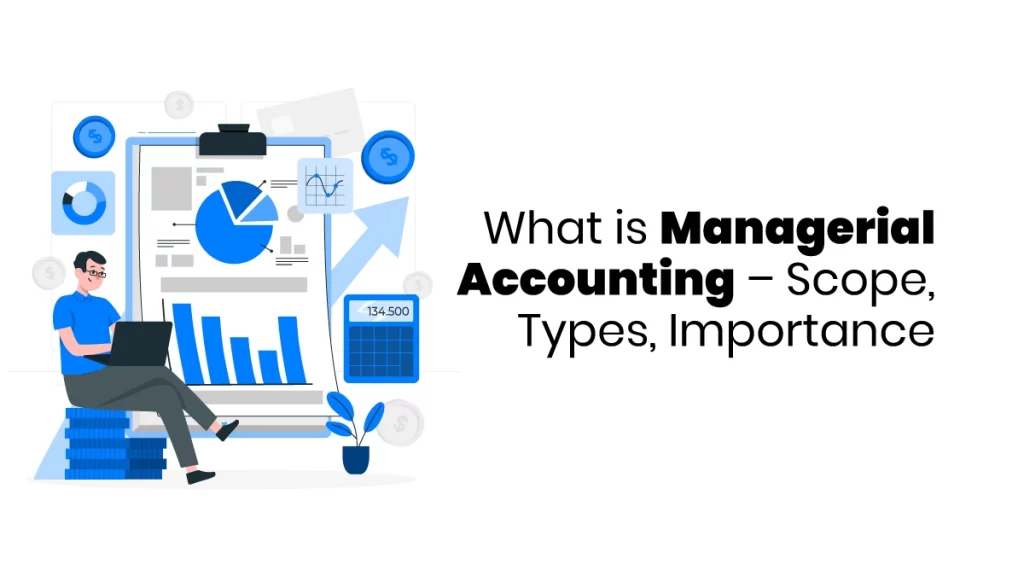Managerial accounting is also known as management accounting which helps in the process of creating documents, statements and reports. This managerial accounting allows one to make better decisions in their business performances. Apart from these, managerial accounting is also used for many of the internal purposes of the business processes.
What is Managerial Accounting?
Managerial accounting, or management accounting, is a specialized branch within the accounting realm dedicated to furnishing financial data and analyses tailored for internal stakeholders. These stakeholders primarily include managers, executives, and decision-makers within a company.
This accounting discipline encompasses several pivotal components: budgeting, cost accounting, performance evaluation, forecasting, and strategic planning. Employing tools like cost-volume-profit analysis, variance analysis, and relevant costing methods, managerial accounting aims to provide in-depth insights into costs, profitability, and the business’s overall performance.
Types of Managerial Accounting
Let’s read the types of managerial accounting;
Cost Accounting
Managerial accounting encompasses various types, with cost accounting fundamental to understanding and managing organizational costs. Job costing is employed for projects with unique costs, while process costing is used in continuous production settings. This accounting type aids in tracking, allocating, and managing costs associated with specific jobs or production processes.
Budgeting
Within managerial accounting, budgeting plays a crucial role in planning and controlling financial activities. Master budgeting involves creating comprehensive plans encompassing sales, production, operating expenses, and cash flow. Flexible budgeting adjusts to changes in activity levels, allowing managers to assess performance against dynamic benchmarks.
Performance Measurement
Performance measurement involves analyzing and evaluating the results against planned or budgeted figures. Variance analysis identifies deviations, and key performance indicators (KPIs) offer insights into specific aspects of business performance, aiding managers in making informed decisions.
Product Costing
Product costing methods, such as absorption and variable costing, focus on allocating manufacturing costs to products. Absorption costing complies with external reporting requirements, while variable costing is geared toward internal decision-making, treating fixed manufacturing costs as period costs.
Decision Analysis
Cost-volume-profit (CVP) analysis helps managers understand the relationships between costs, sales volume, and profit, guiding decisions related to pricing, product mix, and sales strategies. Decision analysis also includes evaluating choices such as making or buying decisions and providing insights into cost-effective alternatives.

Segment Reporting
Segment reporting involves preparing income statements for each business segment or division. This enables managers to assess the individual performance of segments, contributing to strategic decision-making and optimizing overall profitability within the organization.
Importance of Managerial Accounting
In simple words, managerial accounting is super essential for businesses. Let’s break down why:
Helps with Smart Choices
Managerial accounting gives managers the financial information they need to make intelligent decisions. It tells them about costs, earnings, and profits. With this info, managers can decide where to invest, how to price products and find ways to spend less and do better.
Gets Resources in the Right Places
Using managerial accounting tricks, businesses can use their money and stuff (like people and machines) best. This means more work gets done, less waste, and goals are met.
Checks How Well Things Are Going
Managerial accounting helps businesses monitor performance. By comparing what happened with what was expected, managers can figure out what’s working, what needs fixing, and what should be celebrated.
Keeps Costs in Check
Managerial accounting shows businesses where their money goes and how things cost. This helps find ways to save money, make production smoother, and determine if the money spent is worth it.
Plans for the Future
Managerial accounting helps businesses plan for what’s coming next. It helps set budgets, decide on money goals, and guess what will happen based on what happened before. This way, businesses know where they’re going and how to get there.
Rewards Good Work and Keeps People Accountable
Managerial accounting makes measuring how well people do their jobs easy. By tying this to rewards and recognition, businesses can encourage people to do their best, meet goals, and always try to improve.
Talks to Outsiders
Even though managerial accounting is primarily for inside the business, it also helps talk to people outside, like investors or regulators. Giving them clear and accurate money info builds trust and makes communication smooth.
The Scope of Managerial Accounting
Managerial accounting surpasses traditional financial reporting, embracing a comprehensive scope that amalgamates financial and non-financial information. Delving into the scope of managerial accounting reveals its multifaceted role:
Non-Financial Performance Metrics Integration
Managerial accounting goes beyond financial metrics, incorporating non-financial indicators like customer satisfaction, employee productivity, quality control, and environmental sustainability. This holistic approach gives managers a nuanced understanding of organizational performance, enabling well-informed decision-making.
Strategic Cost Management Focus
By addressing strategic cost management, managerial accounting strategically analyzes costs, delving into value chains, activity-based costing, and identifying cost drivers influencing competitive advantage. This strategic perspective empowers businesses to optimize costs aligned with overarching strategic goals and customer value.
Decision Support for Strategic Initiatives
Playing a pivotal role in decision support for strategic initiatives, managerial accounting conducts financial analysis, scenario modeling, and sensitivity analysis. This facilitates the assessment of strategic options, financial feasibility, and potential outcomes. Managers are thus equipped to make informed decisions when venturing into new markets, launching products, or implementing significant organizational changes.
Risk Analysis and Mitigation Incorporation
Managerial accounting incorporates risk analysis and mitigation techniques to evaluate and manage organizational risks. This entails identifying potential hazards, quantifying their impact, and formulating risk mitigation strategies. By integrating risk analysis into decision-making processes, managers can make informed decisions safeguarding the organization’s financial health and reputation.
Performance Evaluation Expansion
Expanding its scope, managerial accounting includes performance evaluation methodologies such as outcome measurement frameworks, program evaluation, and cost-effectiveness analysis. This extension enables effective monitoring and evaluation of programs, resource allocation, and continuous performance improvement within unique organizational contexts.
Embark on a journey into the forefront of accounting expertise with Finprov’s prestigious accounting training programs. Explore a range of job oriented short term courses, including CBAT, PGBAT, Income Tax, Practical Accounting Training, PGDIFA, DIA, GST, SAP FICO, Tally Prime, and MS Excel, meticulously designed to meet the diverse needs of learners at various career stages.
The role of accounting in business is paramount, serving as the cornerstone for financial management and providing crucial insights into an organization’s economic health and decision-making processes. Our 6-month accounting courses online prioritize practical training, ensuring you acquire skills directly applicable to real-world scenarios. At Finprov, we are committed to offering education that transcends traditional boundaries, guaranteeing your success. Our comprehensive accounting training and placement assistance opens doors to lucrative opportunities in India, providing a clear pathway to enhance your skills for a more promising and prosperous future.





















